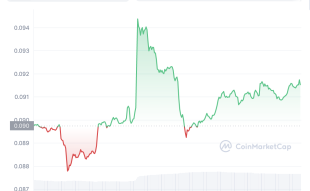Join Our Telegram channel to stay up to date on breaking news coverage
Last spring, Miami Mayor Francis Suarez unveiled an 11-foot, 300-pound replica of the Wall Street bull made of black fiberglass, hailing it as a sign of the city’s emergence as the “capital of crypto.”
“Welcome to the future,” he exclaimed, urging that before the year is out, digital money like bitcoin be “integrated into every aspect of society.”
Eight months later, however, the Republican mayor’s goal of making Miami a center for the cryptocurrency industry has encountered a roadblock.
Miami residents who heeded Suarez’s advice to invest in virtual currencies have been hurt by the sharp decline in the value of bitcoin. The local cryptocurrency known as MiamiCoin is now essentially worthless. The collapse of the cryptocurrency exchange FTX also had an impact here.
The Bahamas-based exchange founded by Sam Bankman-Fried planned to establish its American headquarters in Miami. The Miami Heat play their home games at FTX Arena, one of the city’s iconic stadiums. Officials from Miami-Dade County are now requesting that the judge cancel the $135 million, 19-year naming rights agreement.
Suarez’s detractors say the cryptocurrency market’s collapse has emboldened them in their belief that Miami has once again recklessly staked some of its future on unproven technology and shaky economics. There is also concern about whether Miami will continue to be a popular location for young tech professionals now that the restrictions related to the pandemic in San Francisco and New York have been relaxed.
Billy Corben, a documentary filmmaker and a steadfast critic of Suarez’s adoption of bitcoin, said: “A bunch of con men, selling imaginary coins and magic beans is not that interesting of a story.” But the reality is that the city was drawn into it by the government and its elected officials, who were complicit in it.
Still optimistic about the future
However, there are few indications that local crypto investors and elected officials are reconsidering their embrace of digital currencies and blockchain technologies throughout Miami, a city that was founded on risky financial transactions and boom-bust economic cycles.
Instead, they are betting that the city will survive what is becoming known as a “crypto winter” and that bitcoin will recover, helping to reposition the city as a center for innovation, finance, and technology.
Crypto enthusiasts flocked to boisterous parties and exhibits at Miami’s renowned art fair earlier this month. Each December, Art Basel, a festival that combines art and digital currencies, attracts famous people, artists, and locals to Miami.
At its exhibit inside the Miami Beach Convention Center, the digital company Tezos gave attendees the chance to mint their own works of art on its blockchain. A physical replica of a non-fungible token (NFT) from the CryptoPunks collection was displayed at the Institute of Contemporary Art across Biscayne Bay in the opulent Design District of the city. The picture was displayed next to an Andy Warhol painting titled “American Lady” and featured a pixelized representation of a woman with the name 305, the famous area code for Miami.
Pussy Riot, a Russian punk rock band, played nearby as fairgoers browsed the artwork and bartenders poured vodka and tequila drinks. Their songs mixed support for cryptocurrencies with lyrics about sexual freedom.
One man who collects and creates CryptoPunk art work and would only identify himself by his digital identity, CryptoNovo, said,
“We have CryptoPunks next to Warhols, and 18 months ago you wouldn’t even think of that.”
Miami is still a city that accepts CryptoPunks as residents.
“Just a single hurricane will do it”
Suarez has made promoting Miami as the future of blockchain and digital currencies his signature platform for more than two years.
He suggested that tech firms relocate from the chilly San Francisco to the year-round warm Miami, offered to accept his salary in bitcoin, and even thought about paying city employees with it. Additionally, he introduced MiamiCoin, a digital currency developed in association with nonprofit CityCoins. Suarez hoped that one day the government of Miami would receive 30% of the profits, eliminating the need for local taxes.
His sales pitch to outsiders is that Miami is ideally situated to develop into a hub for cryptocurrency businesses due to its proximity to markets in Latin America, the Middle East, and Europe, where interest in decentralized currencies is rising.
He referred to it as the “Crypto Capital of the World” on Twitter in June 2021.
Crypto capital of the world. https://t.co/wykSH0mkNp
— Mayor Francis Suarez (@FrancisSuarez) June 11, 2021
Suarez’s wager appeared to be paying off until recently.
Miami was identified as a potential new tech hub in a report released in February by the research company Telstra Ventures. Investments in blockchain, a digital ledger that stores and displays all transactions, increased by 2,061 percent in the city in 2021. In terms of technology-related financial deals that year, Miami was fourth only to San Francisco, New York, and Los Angeles, according to Telstra Ventures.
The report’s authors stated that Mayor Suarez’s plan to make Miami the blockchain and cryptocurrency capital of America was succeeding.
But the case for Miami as a capital of cryptocurrency has always had some flaws. The city is not close to an Ivy League university that could act as a recruitment center for tech workers, according to skeptics. As young workers flocked to Miami during the pandemic, that worry was somewhat allayed. There are now doubts about their future plans.
There was a “unspoken agreement,” according to Simon Glenn, the chief marketing officer of the Blockchain Center, a New York-based organization that supports distributed ledger technology, for many pioneers in the cryptocurrency sector to relocate to or hang out in Miami during the pandemic.
Glenn, however, noted that it might take more than just balmy weather and white sand beaches to keep highly educated workers in Miami.
Miami is popular right now because it is a place where you can wander the streets and simply run into someone interesting who is relevant to you, the man said. “However, I’m not sure if it goes on.”
In addition, Glenn, 26, who commutes between New York and Miami, said that
“everyone, including the mayor, is betting that they will stay. But since these are small towns, it only takes one literal or metaphorical hurricane for everyone to flee to San Francisco or New York.”
“This is a younger generation thing”
One crypto venture capitalist, Raymond Yuan, the founder and CEO of Singapore’s CTH Group, believes Miami will continue to be the center of blockchain innovation in the future.
Yuan recently revealed that his business will relocate its global headquarters to Miami, and he plans to purchase a second residence there.
CTH Group is investigating ways to use blockchain technology to enhance online experiences with “plug and play” games, among other things. Juan asserted that it will be up to Miami’s “young generation” to make that happen.
Yuan said:
“This [the decision to move] was quite simple for us. Miami is a very diverse city. People there are very young and energized, and it serves as a bridge between North and Latin America.”
Yuan continued by saying that many start-ups are currently making a conscious effort to avoid locating in Silicon Valley or Seattle, where they would have to operate in the background of the major technology firms that created contemporary internet applications.
When a new technology cycle occurs, “we have seen many stories where the old giants try to assert and hold their power and don’t want to hand over to new companies,” Yuan said. “Younger companies and a younger generation are at issue here.”
Doodles, which enables users to own NFT graphics that resemble cartoon characters, was moved to Miami in August by Julian Holguin, the company’s CEO. At a recent summit, Holguin, who is still optimistic about the future of both cryptocurrency and Miami, told the audience that industry setbacks are actually a sign of growth.
He claimed that this new technology was just like any other that was in its infancy. Long term, the technology we are developing will have a much more positive effect than any of the suffering people have experienced recently.
However, analysts warn that it will take time for the industry to recover after crypto currencies lost more than $2 trillion in market value over the past year.
According to Katie Talati, the director of research at Arca, a Los Angeles-based investment firm that specializes in digital assets, U.S. cities like Miami and New York may be further hampered in their attempts to capitalize economically on blockchain technologies by stiff competition from cities in Asia and Europe.
Even though he thinks the industry has suffered a significant setback, Talati insisted that it is not the end of the industry.
Martin Namdy, 48, claimed that despite FTX’s bankruptcy, he has already resumed his efforts to raise awareness of the potential advantages of cryptocurrency, particularly in developing countries and socially and economically disadvantaged areas domestically. He claimed that digital currency enables quick asset transfers, including remittances.
And when you look where Miami is, you have all of South America and the Caribbean that can benefit from decentralization, said Namdy, a Haitian American who goes online by the name “Captain Haiti.”
To halt the quick redevelopment of Miami’s historic Little Haiti neighborhood, Namdy is attempting to use an NFT. Namdy established an NFT after learning that 17 local buildings will be sold at auction on December 15 in an effort to raise money to make a bid on at least one of the structures. A song is available for purchase by the general public for $18.04 in honor of Haiti’s independence in 1804.
Namdy claims that if he is successful, the structure will be used for affordable housing or neighborhood gatherings.
Selling one million NFTs in a matter of days is not inconceivable in the world of cryptocurrencies, he claimed. And by doing so, we will be able to make decisions based on community needs rather than just capitalism.
Opportunities are “tsunamis”
However, there is still a great deal of skepticism in South Florida regarding both the potential advantages of cryptocurrency and Suarez’s choice to become a leading proponent of the sector.
Democratic National Committeeman Thomas Kennedy, a resident of Miami, charged that Suarez was associated with “grifters” who were pursuing “fever dreams” rather than addressing problems like the severe lack of affordable housing and recurrent flooding brought on by sea level rise and overdevelopment.
Kennedy characterized Suarez’s wager on MiamiCoin as
“I think he is reckless, dangerous, irresponsible, and neglectful. It is just stupid and disappointing to see our mayor hanging out with grifters at these tech conferences. If you live here, you see that Miami has a lot of problems.”
Miami’s desire to become wealthy through cryptocurrency is compared to the city’s long history of supporting risky business ventures, according to Corben, the director of the popular documentary film “Cocaine Cowboys.”
Miami doesn’t have a native industry, so we keep working hard, he said.
“As long as the drinks are flowing and the money is coming in, no one questions where this money is coming from.”
In an interview, Suarez stated that he had always been aware that new technologies might not take off right away.
According to him, the failure of MiamiCoin to succeed was comparable to the collapse of FTX.
Although these technologies are a good idea, they are not always reliable.
Miami’s relationship with blockchain technologies is still relatively new when it comes to cryptocurrencies.
Suarez referred to them as “tsunamis of opportunity.” We also have two choices. With a surfboard in hand, we can ride the wave like a tsunami. Alternately, we can try to flee from it, hide, and act as though it doesn’t exist, risking being washed away.
What do you anticipate Miami will decide?
Related
- FTX Crash Kills The Miami Nightlife
- Miami City Taps Mastercard, Time, And Salesforce To Launch NFTs
- FTX used customer funds to fund risky bets, which led to its demise
Join Our Telegram channel to stay up to date on breaking news coverage


